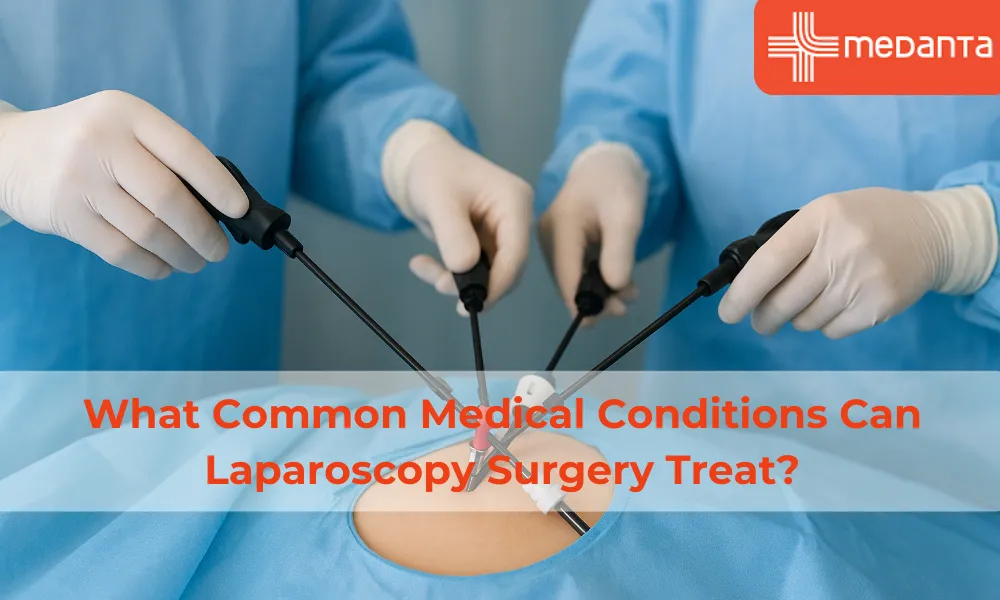What Common Medical Conditions Can Laparoscopy Surgery Treat?

TABLE OF CONTENTS
With the healthcare sector increasingly dominated by advanced technology innovations, laparoscopy surgery acts as a testament to the fusion of technology and medical expertise.
Laparoscopic surgery, also called keyhole surgery, is a minimally invasive technique that primarily helps examine the organs inside your abdomen. However, its application is not restricted to just abdomen diagnosis. Continue reading to learn the medical conditions that can be effectively managed and treated via laparoscopy.
Laparoscopy: What is it?
A laparoscopy is a surgical procedure that is performed to examine the organs inside your abdomen and other closed spaces, like reproductive organs, women’s pelvic organs, knees, etc. This minimally invasive procedure requires small incisions and involves low risk.
When it’s performed, a doctor uses an instrument named a laparoscope (long, thin tube) equipped with high-intensity light and a high-resolution video camera. He inserts this tube through a small cut or incision in your stomach or abdomen. And as the tube moves along, the camera sends the video to the computer screen.
A laparoscopy, or an appendix laparoscopy, allows the doctor to see inside your abdomen in real time, obtain biopsy samples, and perform surgery.
What is Laparoscopy Used For?
The following are a few reasons why laparoscopy can be used:
To diagnose the problems in the abdomen and pelvis, Laparoscopy is primarily performed to look for the issues that might be causing discomfort in your abdomen or pelvis region.
To diagnose the suspicious area that might be cancerous: Doctors also perform laparoscopy to obtain samples of lymph nodes or remove them from the abdomen or pelvis. This surgical procedure is commonly used for individuals with gynecologic cancers, such as endometrial, cervical, and ovarian cancer.
Besides this, laparoscopy surgery can also be performed to evaluate the following listed organs:
Appendix
Pancreas
Liver
Spleen
Gallbladder
Small intestine and large intestine
Stomach
Pelvic or reproductive organs
What Medical Conditions Can Laparoscopy Help Diagnose?
Laparoscopy is a cutting-edge surgical procedure that can help diagnose the following different medical conditions:
Endometriosis: It’s referred to as the presence of endometrial tissue (the womb lining) outside the womb.
Appendicitis: This medical condition involves painful swelling of the appendix.
Pelvic inflammatory disease: It’s caused by the bacterial infection in the women’s upper genital tract, including the womb, ovaries, and fallopian tubes.
Ectopic pregnancy: This is a type of pregnancy that develops outside a woman’s womb.
Fibroids: Non-cancerous tumours, fibroids grow in or around the uterus (womb).
Ovarian cyst: It’s a fluid-filled sac that can develop on the female’s ovary.
Undescended testicles: This medical condition can occur during a boy's childhood when he is born without one or both testicles in his scrotum.
Cancers: Laparoscopy can be used to diagnose different types of cancers, such as liver, ovarian, pancreatic, bile duct, or gallbladder cancer.
Infertility: A combination of both laparoscopy and infertility can provide fruitful results. Laparoscopic surgery can help doctors diagnose the underlying causes of infertility by evaluating reproductive system structures like ovaries, uterus, and fallopian tubes.
What Medical Conditions Can Laparoscopy Help Treat?
You will be amazed to learn that laparoscopy can help treat several medical conditions and some of these are as follows:
Removing a swollen appendix
Treating a small cancer in the areas like cervix, ovaries, uterus, colon, and kidney.
The laparoscopic hernia procedure is performed to repair different types of hernias, such as the hernias found in the groin.
Removing the gallbladder for treating gallstones
Repairing burst or bleeding stomach ulcers
Removing a section of the small or large intestine to treat digestive conditions like Crohn’s disease or diverticulitis.
Removing the womb (hysterectomy) to treat endometriosis, pelvic inflammatory disease, painful periods, or heavy periods.
Performing weight loss surgical procedure
Removing abnormal growths like fibroids
Treating ectopic pregnancy by removing the embryo and preventing fallopian tubes from damaging.
Knowing the Risks of a Laparoscopy
There might be some risks associated with a laparoscopy, such as injury to the organs in the abdomen, bleeding from the cuts or incisions, or the carbon dioxide gas going into places other than your abdomen.
Moreover, your healthcare professional might sometimes not advise laparoscopy if you have the following:
Long-term (chronic) tuberculosis
Advanced cancerous growths on the abdominal wall
A lot of scar tissue (adhesions) due to other surgical procedures
A bleeding problem, like low blood platelet count (thrombocytopenia)
Been prescribed blood-thinning medicine
How Can You Get Ready for Laparoscopic Surgery?
Here is how you can get ready for a laparoscopic surgery:
First and foremost, your healthcare provider will explain what the laparoscopy procedure involves and what results you can expect.
Next, you will have to sign the consent form for the laparoscopic surgery and anaesthesia use.
Your doctor will also ask questions about your medical history, bleeding disorders, and medications. He might also give you a physical exam to ensure you are healthy.
You might be asked not to eat or drink for at least eight hours before the surgical procedure.
You should inform your surgeon if you are sensitive to medicine, anaesthesia, or latex. In addition, tell him if you are pregnant or suscept to pregnancy symptoms.
Depending on what condition laparoscopy needs to treat, you might be asked to have an oral laxative to clean your bowel prior to surgery. Moreover, you might also be given a special scrub, antibiotic, or sedative before the procedure.
To Sum Up it all!
Laparoscopy surgery is a game-changing surgical procedure in the medical field that offers patients a less risky, quicker, and less painful alternative to traditional surgeries. This cutting-edge surgery can be performed to diagnose and treat various medical conditions, from gastrointestinal and abdominal conditions to gynaecological, weight management, and urological conditions.
At Medanta Hospital, you can expect the highest standard of laparoscopy surgery and care from experienced surgeons and healthcare professionals.






